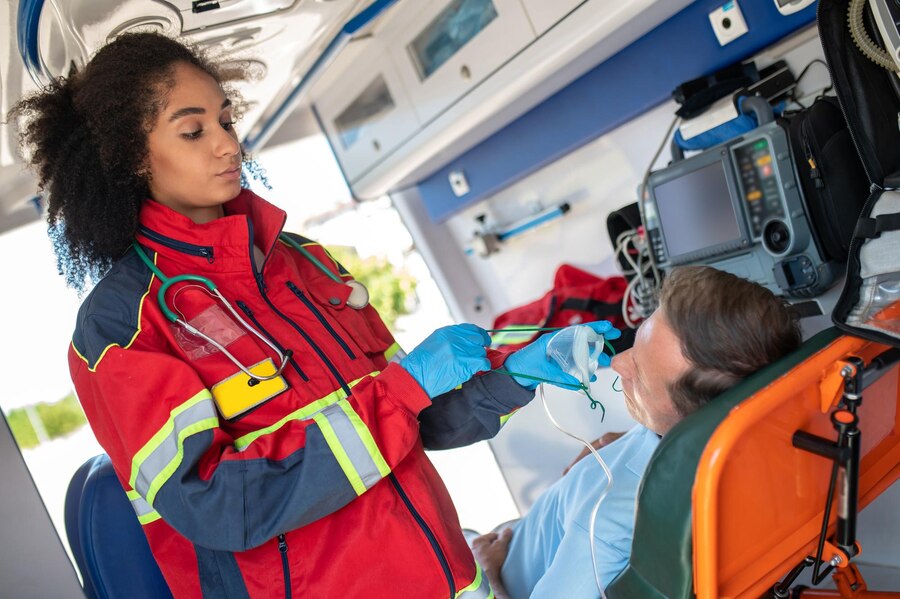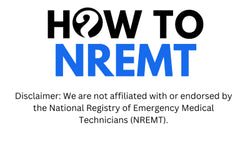Are you starting your career as an emergency medical technician in Rhode Island? Does the motivation to serve the community exist in Ocean State? Does watching EMTs rushing to help those in need inspire you? Now’s your time to jumpstart your journey!
In Rhode Island, EMTs respond to emergencies from the busy streets of Providence to the coastal roads of Newport. However, they must undergo a process to become a certified EMT in the state. It requires meeting basic eligibility criteria, completing a state-approved EMT training, and finally, passing the NREMT cognitive exam. Many students study hard but still struggle to pass. Smart preparation makes a big difference.
Here’s how to become EMT-certified in Rhode Island and prepare for the test with confidence.
Step 01

Confirm Your Eligibility
Before enrolling in training, you need to meet the basic requirements:
- Be at least 18 years old
- Hold a high school diploma or GED
- Have a current CPR certification (Healthcare Provider level)
- Be mentally and physically fit for EMT duties
- Pass a criminal background check
The Rhode Island Department of Health may also request other information. Once you meet these criteria, you can start your training.
Step 02

Enroll in a Rhode Island-Approved EMT Course
Your training must be through programs accredited by the Rhode Island Department of Health, Bureau of EMS. You can find these programs at community colleges, EMS training centers, and fire academies. These programs coverambulance ride-alongs and classroom-based learning. Completing this training lets you take the NREMT cognitive exam.
Step 03

Pass the NREMT Cognitive Exam
This is where many candidates struggle. The cognitive exam only has a 60% passing ratio for the first attempt. This indicates the complexity of this test. The NREMT cognitive exam is not just about memorization. It tests how you think in real-life scenarios under pressure.
This computer-adaptive test adjusts the difficulty level of each question based on your responses to the preceding questions. Additionally, the National Registry recently updated course domains for the test, keeping in mind the current patient care needs. Expect 70–120 questions covering the following five areas:
- Scene Size-Up and Safety
- Primary Assessment
- Secondary Assessment
- Patient Treatment and Transport
- Operations
Note: Items related to pediatric patient care are integrated throughout all domains.
Instead of passive reading, effective preparation involves using NREMT practice exams, signing up for a structured NREMT prep class, and personalized coaching from an experienced NREMT prep tutor. This is the best way to study for the NREMT.
Step 04

Apply for Rhode Island EMT Certification
After passing the exam, apply through the Rhode Island Department of Health, Bureau of EMS. Submit the following documents on the portal:
- Proof of EMT course completion
- NREMT cognitive exam results
- CPR certification
- Background check clearance
- Application fee
Once approved, you will receive your EMT certification.
Step 04

Maintain Your EMT Certification
EMTs are required to renew their certification every two years in Rhode Island. To renew, you will need:
- A valid CPR certification
- Required continuing education (CE) hours
- An active NREMT certification or evidence that you have met Rhode Island CE requirements
If you fail to renew, you may have to retake the NREMT. It's easier to stay up-to-date.
National vs. Rhode Island EMT Certification
Here’s a straightforward comparison:
| Requirement | National Requirements | State Requirements |
|---|---|---|
| NREMT cognitive exam | Required | Required |
| CPR certification | Required | Required |
| ALS psychomotor skills test | Not required | Not required |
| State-approved EMT training | Required | Required |
| Background check | Not required | Required |
| State application | Not applicable | Required |

- Choosing a selection results in a full page refresh.




